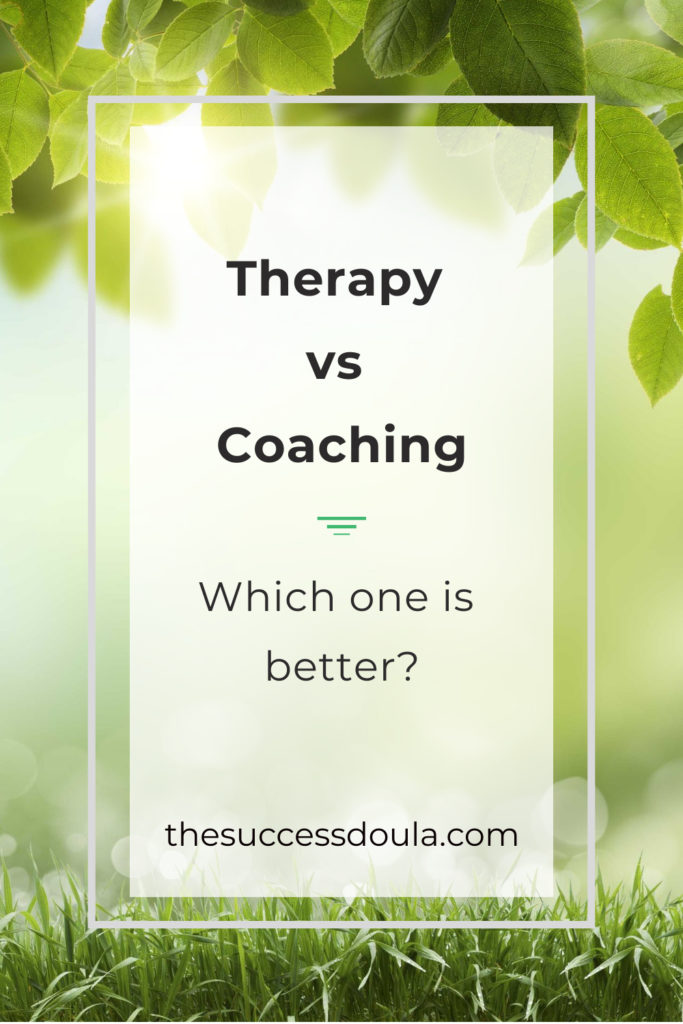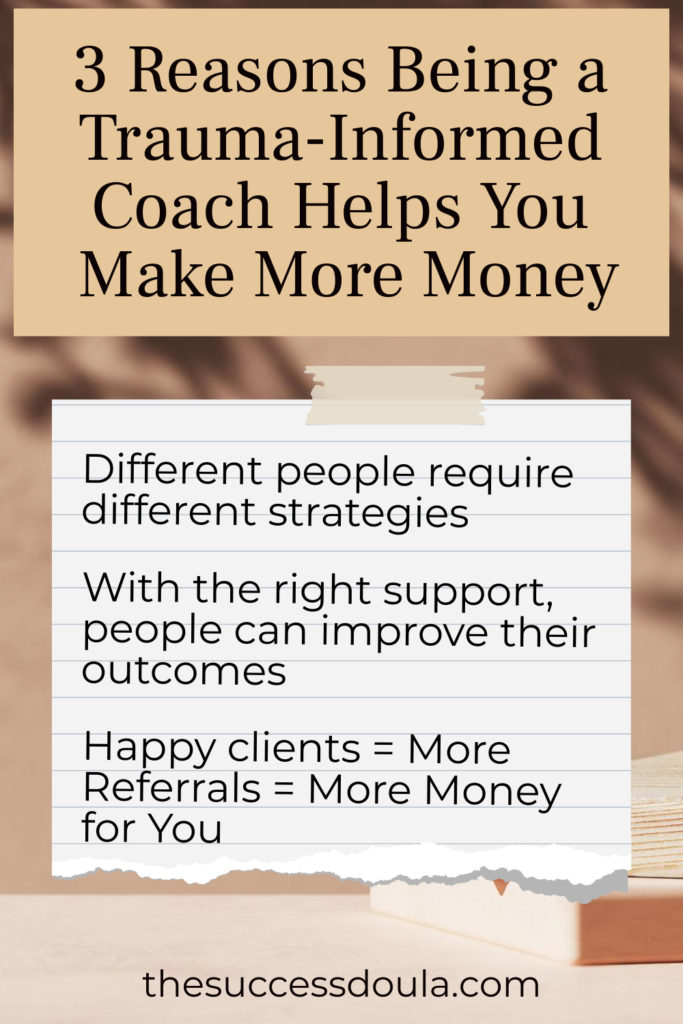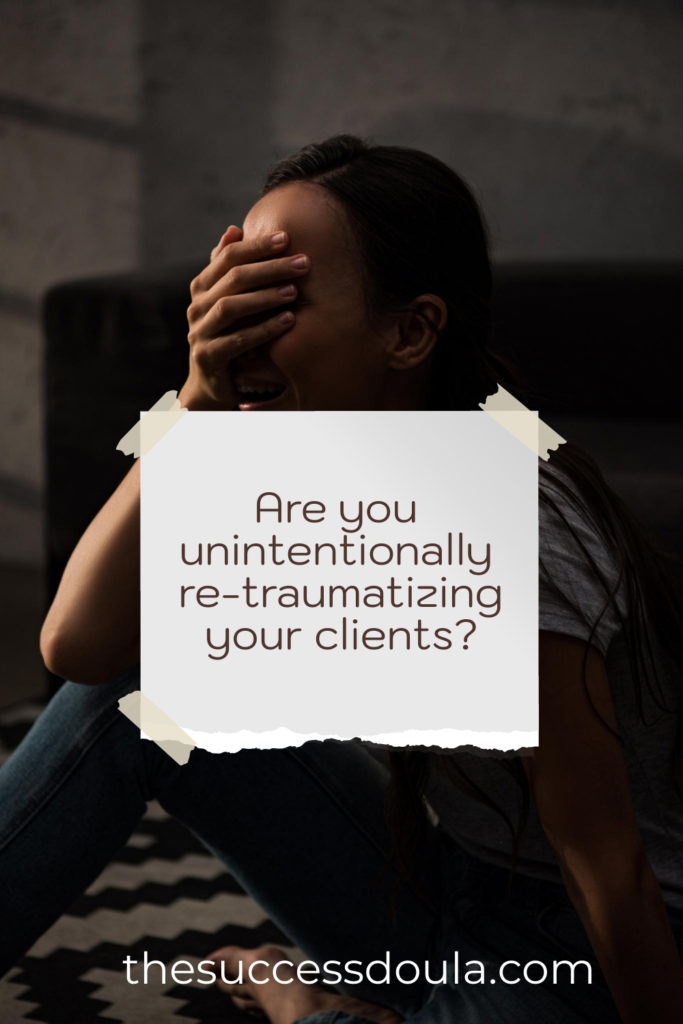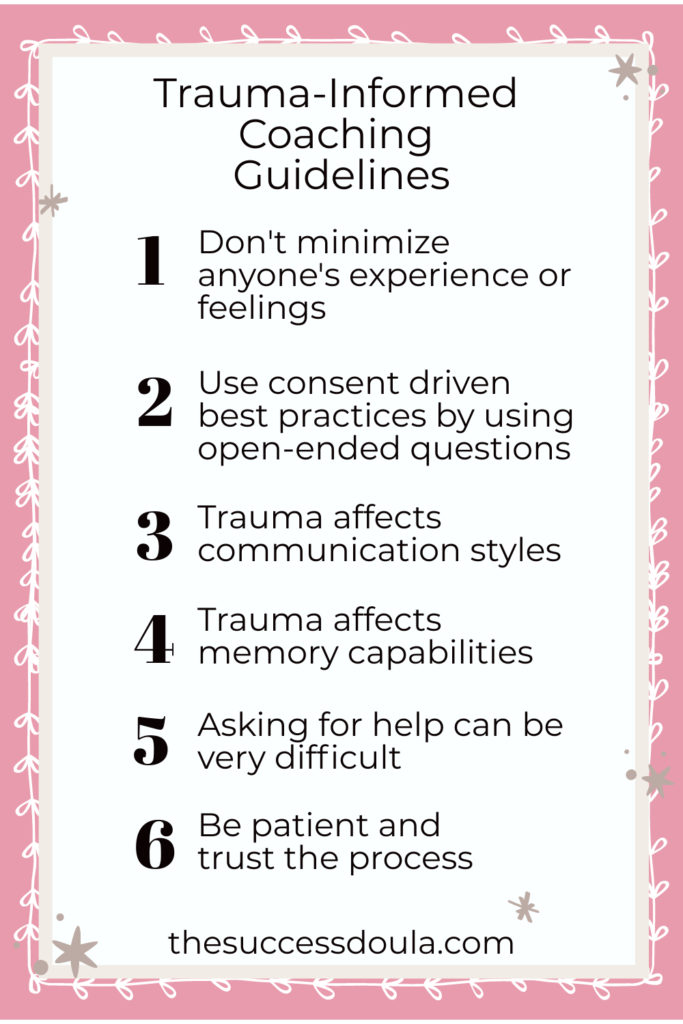Why You Need a Trauma-Informed Coach as an ADHD Entrepreneur
The Intersection of Trauma and Entrepreneurship
First things first, let's talk about what we mean when we say "trauma." Trauma is not just "Big T" stuff, like major accidents or devastating life events. It includes "Little t" experiences—those repetitive stressors or microtraumas that we may not even realize have an impact on us. Trauma gets stored not just in your brain, but in your entire nervous system.
What does this have to do with business? When you embark on the journey of entrepreneurship, you don't get to compartmentalize. If you have unresolved traumas, they are coming along for the ride, impacting your decisions, reactions, and even your business success. And let me tell you, they're especially persistent when you have ADHD.
The ADHD Factor
When you have ADHD, your neurobiology already presents unique challenges. Your brain is already working a bit differently, affecting motivation, focus, and resilience. Add some unresolved trauma into the mix, and it can become a complex web affecting your business efforts.
Why Not Just Any Coach Will Do
Alright, strategy is essential. No question there. But if you're not addressing the underlying traumas that influence your mindset, no amount of strategy is going to get you where you want to go. A trauma-informed coach integrates awareness of how your body and mind respond to stress and tailors the coaching to help you navigate through it.
How Trauma Responses Affect Your Business Decisions
Whether your most practiced stress response is fight, flight, freeze, or flop, each has its own implications in a business context. Let's say your default is "flight." You'll excel at planning but might struggle with follow-through. On the flip side, a "freeze" or "flop" response can result in procrastination —definitely not what you want when you're trying to grow a business.
The Holistic Approach to Entrepreneurship
You're not a machine programmed to execute tasks. You're a complex, beautiful being with a mind, body, and spirit. You deserve a coaching approach that honors all of these aspects. A trauma-informed coach can guide you through not just the strategy but also the emotional and physiological aspects of running a business, particularly if you have ADHD.
In Conclusion
If you find yourself struggling to get your business off the ground, consider this: It might not be a lack of strategy or even a mindset issue; it could be unresolved traumas that are throwing a wrench in the works. A trauma-informed coach can help you identify, process, and navigate these challenges, providing a fuller, more holistic approach to entrepreneurial success.
So, take a moment today to connect with your "big why." Revisit your business goals, align them with your soul's purpose, and if you find gaps or blocks, perhaps a trauma-informed approach is the missing piece of your puzzle.
Stay incredible, and until next time, keep owning your journey!
We all want to be authentic, don't we? We want people to know the "real" us, warts and all. But being authentic doesn't mean you can say whatever you want without considering how it might affect other people. There is a big difference between speaking your mind and being rude. Read on to learn about how to be authentic without being an a-hole.
Definition of Authentic:
"True to one's own personality, spirit, or character"
Authenticity is something that means different things to different people. For some, it might mean living their lives according to their own set of principles. For others, it might mean being real and genuine in their interactions with other people. Most people want to be authentic, but they don't know how.
To truly live authentically you must be true to yourself, even when it's uncomfortable, which requires you to have clear boundaries. But boundaries cannot be created until you understand what is and isn't important to you. Once you know what's important to you, you can begin to set boundaries and create a life that aligns with your values.
The problem is that most people do not really know what their values are. To find your values, it requires you to take time, pause, and listen to your inner voice. To reach down into your heart and listen to the voice that is screaming to be heard, not listening to the "logical" mind.
What values is the voice in your heart in alignment with?
This will be different for everyone and it's important to remember that you don't have to share your values with everyone, and you don't have to justify them to anyone. You simply need to know what they are and be true to them.
Take some time to think about what life looks like, what you behave like, and how you respond when you are living in alignment with your values. For example, if you value connection but you are quick to point out the flaws in others, are you living in the value of connection then? No, that is not living in the value of connection.
When you value connection, it would mean that you pause and identify a way to connect to the person before you speak. Identifying your intention behind your words first, instead of unloading your thoughts on the other person... instead of speaking your mind.
Of course, connection may not be one of your higher values and that's perfectly fine. But once you take the time to identify your values, whatever they may be, then the next step is to think about the boundaries that are required to live in those values.
Boundaries are not necessarily hard Yeses and hard Nos (although there is a time and a place for those). Boundaries are made with love. Love for yourself, and love for others. Boundaries require you to look inside yourself and feel what you need, not think about what you need. Boundaries require that you step outside yourself to see what is the most compassionate and understanding for all parties involved. Unless of course your heart is telling you that you want to live isolated and alone, but I highly doubt that considering that you are a human which means you are designed to be in community.
Your entire nervous system is built upon living in community and being around others. Which means, that your words and actions impact those around you as much as those around you impact you.
So the next time you have the urge to speak your mind, take a moment to notice whether the words that your mind wants to speak are aligned with the voice in your heart. Are those words aligned with speaking in a way that intentionally or unintentionally hurts other people's feelings all in the name of being true to yourself? Or can you stop and notice the situation? Find words that maintain your boundaries and standards while creating an authentic and compassionate connection with the recipient of your words.
If you are a healer, coach, or another profession where people are coming to you and are in a vulnerable state, it is imperative that you hold yourself back from speaking your mind from a reactionary state. You are creating the container for others to transform. You are given the gift of helping to create safety for others to speak their mind, to release their thoughts, and to ultimately take action that gets them closer to their goals.
Therapy is an intense, deep dive into someone's past and their trauma. It can be very helpful for those who have experienced difficult events in their lives that have left them feeling stuck or powerless to do anything about it. But do you really need to rehash painful moments and try to make sense of everything?
One of the beautiful things about therapy is that it helps us make sense when things seem like they don't make sense. But most of the time, we can make sense of our lives without having to delve into every painful moment or revisit every mistake that has lead us here. Some things in life we may never understand, and that's okay.
That's where coaching comes in. Coaching helps us to move forward without understanding everything. In general, coaching follows these basic guidelines:
1. Establish goals by asking questions
2. Break those goals down into smaller, more manageable steps
3. Provide encouragement
4. Find solutions to problems as they arise by asking questions
5. Celebrate successes!
As you can see, the main point of coaching is to ask questions and be supportive. It isn't about giving advice or providing pseudo therapy (which if you're a coach, you can get in trouble for providing therapy services without being a licensed professional). Coaching is about helping the individual uncover the best path for themselves.
No one knows what it's like to live your life. No one will know the best route to take except you.
A good coach will ask you thought provoking questions so you can find the solutions that will work best for you. That is the beauty of coaching.
Coaching is not about helping people through their trauma, but instead about supporting them when they get triggered. It is imperative that coaches are trained in trauma-informed care and practices so they can help them find methods and strategies that will help them achieve their goals despite getting triggered.
But if you've experienced trauma and you're having difficulty moving on in your life, a good therapist will help you with the symptoms that are keeping you from enjoying life.
So which is better? That depends on whether you want to make sense of your past to help you move into your future or whether you're ready to move one without rehashing your past. Both are great options... the decision is yours to make.
If you're a coach and you are interested in becoming truly trauma-informed, enroll in my Trauma-Informed Coaching Certification program.

As a coach, you are in a unique position to help your clients through some of the most difficult challenges they will ever face. More and more, people are looking for trauma-informed coaches to help them find solutions to their problems. As a result, there is greater demand than ever before for these professionals. Being a trauma-informed coach means knowing how to react and support your clients in a healthy way without stepping into the realm of therapy. Here are three reasons why being a trauma-informed coach is beneficial for both your clients and your bottom line.
1. Different people require different strategies
Not all strategies work for everyone because people are impacted by trauma differently. What works for one person may not work for another. This is why it's important to be trauma-informed, so you can understand how different strategies might impact your clients. When you can help more people achieve results, it reflects positively on you and your business.
2. With the right support, people can improve their outcomes
Another reason why it's important to be trauma-informed is because you can inadvertently retraumatize someone. This can happen if you're not aware of how different trauma responses present themselves. You can minimize triggering your clients and help them achieve results even faster.
3. Happy clients = More Referrals = More Money for You
One of the hardest objections for service providers to overcome is the money objection. When someone is referred, the pricing objection is less of an issue. Your worth has already been proven so less sales pitches are needed!
Being trauma-informed is one way to ensure that you have the best chance of providing the support your clients need. If you're interested in becoming a trauma-informed coach, take a look at my Trauma-Informed Coaching Certification program.


We all know that good coaches are the ones who recognize when their clients aren't taking action. What if I told you that excellent coaches also understand why? There are many ways trauma can come out in a client's journey: procrastination, helplessness, victim mindset and self-doubt to name a few. If this is something you've experienced with your coaching clients or want to learn more about how to help them then read on!
Everyone likes to be acknowledge and encouraged, so it's no wonder that most coaches think that the best way to motivate their clients to take action is by using positive reinforcement. Whether they're celebrating accomplishments in the group, providing incentives, setting deadlines, or calling people out on their bullshit, each of these can be really effective but they can also be really damaging, too.
The reason people don't take action is not because they aren't motivated, it's because they're doubtful. Sometimes they're doubtful that the program will actually work. But usually, they're doubtful that they will really be able to make progress.
When someone is suffering with self-doubt, the normally encouraging activities have the opposite effect. You end up highlighting what they haven't accomplished by highlighting what others have done. They feel worthless because they're struggling to reach the deadlines. They feel hopeless because the incentives seem impossible to reach. And when you call them out on their bullshit, they feel like a little kid being called to go to the principal's office because they're in trouble. All of these can be extremely damaging and cause them to feel retraumatized.
Simple phrases such as "you can do this," "no excuses," and "it's all about mindset" when someone doesn't really believe it fuels the self-doubt even more. Self-doubt often leads to feelings of inadequacy and insecurity which leads to more self-doubt. And yet, as coaches we want to help. We focus on the positive trying to be mindful of their feelings. But this focus on trying to be positive for the sake of being positive, even when it's not authentic or helpful, is quite toxic.
When we coach with toxic positivity, we're not actually being positive at all. We're actually re-traumatizing our clients that are struggling with self-doubt.
So, how do we prevent re-traumatizing our clients?
The first step is to be aware of the signs that someone is feeling retraumatized. These signs can include things like procrastination, not taking action, making excuses, and rehashing the same concerns. If you see these signs, it's important to take a step back and assess what might be going on.
Understanding the 5 trauma responses and how to respond to each that I teach about in the Trauma-Informed Coaching certification program will help you guide your clients through the self-doubt and inaction towards confidence and progress.
Ready to uplevel your coaching skills? Enroll in my Trauma-Informed Coaching Certification program.

We all know that coaching is a powerful and transformative process. The relationships we build with our clients can help them overcome barriers they may have faced in the past, but it's important for coaches to understand how trauma-informed care can be used as an effective tool in helping people unlock their potential. In this blog post, I will explain the basic guidelines of trauma-informed coaching.
- Don't minimize anyone's experiences or downplay how it feels to them. All trauma is real and it is as individual as each person's experiences are. As a coach, your job is to empower your clients not belittle them.
- Use consent driven best practices by using open-ended questions to avoid pressuring trauma survivors into giving answers they aren't ready for. Instead ask if now is a good time to explore a topic.
- Remember that trauma can affect communication styles. Sometimes people express anger when they're really scared or sometimes they don't express anger when they're really mad.
- Be aware that trauma survivors often struggle with memory issues. Someone's ability to remember and learn is related to how their nervous systems are regulated. If your clients are asking the same questions over and over it may not be that you are doing something wrong, only that they are not regulated enough to remember the first time (of course, you may need to review your content, too).
- Remember that asking for help can be very difficult for traumatized people.
- Be patient when working with traumatized clients. Trust the process and trust that your clients want to make improvements in their lives
Approaching every client with trauma informed care is essential in order to create a safe and supportive environment for them to make changes in their lives. By using these guidelines, coaches can help their clients feel understood and respected, which is necessary for growth.
Interested in learning more trauma-informed practices? Check out my Trauma-Informed Certification program

